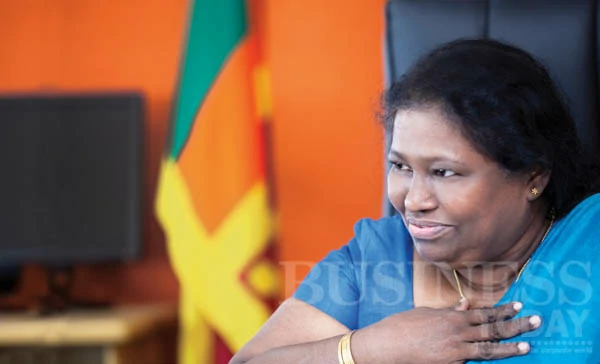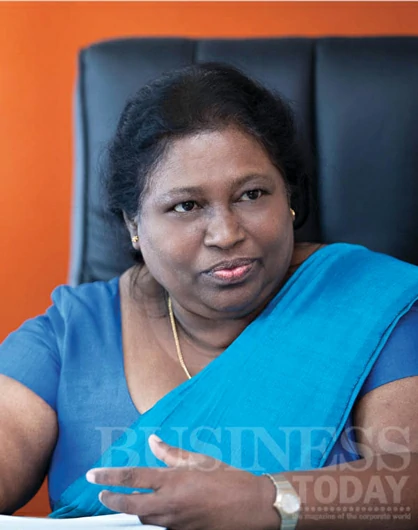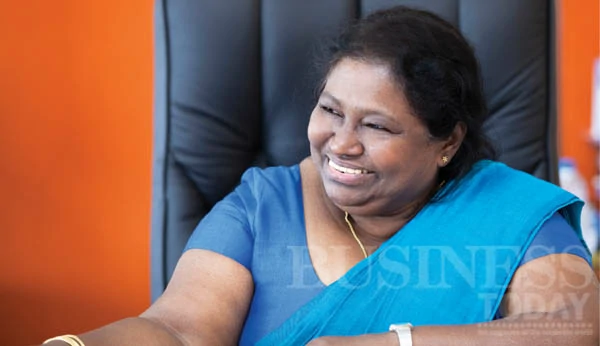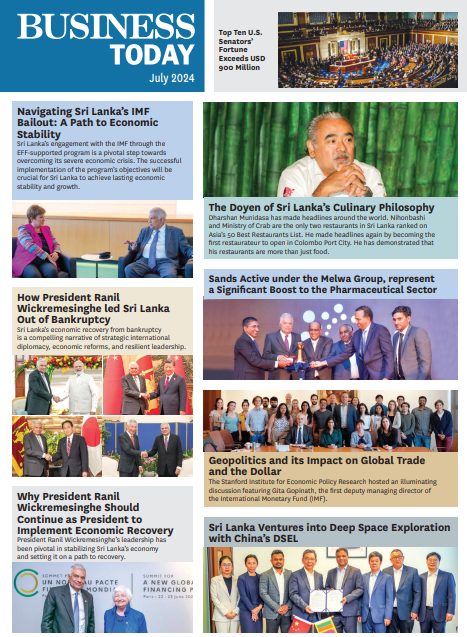
The economic stability of a country is influenced by a sound tax system and over the years Sri Lanka’s tax system has been subjected to fluctuations and complexities. Kalyani Dahanayake, Commissioner General of Inland Revenue speaks about the importance of streamlining the systems that are currently in place, the successes achieved so far and the targets that have been set to maximise revenue, which would impact the economy and the progress of the country.
By Prasadini Nanayakkara and Krishani Peiris | Photography Mahesh Bandara
As the Commissioner General of Inland Revenue, can you tell us your plans for the institution?
Every economy in the world-about 99 percent of the countries, including Sri Lanka, implement the self assessment system when it comes to taxation. That means every taxpayer is allowed to compute his own taxes and send the payment along with his declarations to the department.
Taxation is a very broad subject and unlike in Sri Lanka, developed countries depend considerably on full taxation and whatever other income they receive. However, in our country, in addition to tax and non tax revenue, other means of revenue and domestic and foreign financial support is needed to run the economy. As such, I will be looking into different areas of the tax system, to see how best we can improve and be more effective in earning revenue.
The generation of revenue is hampered due to many reasons that exist within the tax systems and in the administration of these taxes. Fundamentally key performance indicators are crucial for effective tax administration. Therefore, I have come up with several taxation methods that will be implemented to obtain revenue more effectively, and through these methods the success of an organisation can also be assessed easily at any given time.
Firstly, we have to maximise tax compliance. We want to approach on the basis of tax returns that taxpayers are forwarding to the department.
That is their declaration. We do not forcibly ask people for assessments and to pay a specified amount. Ninety five percent of our tax revenue consists self assessments while the remaining five percent are from additional assessments we may impose on taxpayers. These assessments would be derived from the information gathered through different sources, on the basis of each person’s / company’s computations, which will lead to some sort of a disclosure from the standard final accounts and also by examining the accounts that any chartered accountant or any company provides. Further, we go through the accounting standards as well. Similarly, there are different areas to probe into in a final account in order to establish taxes. Therefore, we take selected instances and raise such additional assessments as per the agreement that the taxpayer is having with the department on his liability.
If the taxpayer is unable to agree with us then in those cases we issue an assessment. The taxpayer who is aggrieved by the assessment is allowed to make an appeal within 30 days and if the appeal is received within the specified period of time, we listen to their grievances in three stages of appeal hearing procedures.
As such, maximising on tax compliance is the best strategy towards a cost effective revenue collection. Here, we spend less than one percent for collecting revenue.This is only one mechanism employed to collect revenue where the collection of all taxes, declared and undisclosed, are included. Next would be to establish a broad tax base. Our tax rates are comparatively low, in comparison to other countries, especially in the region. Therefore, the concept of a wider tax base reduces tax rates.
In Order To Achieve The Most Thorough Taxation, I Firmly Believe That Compliance Is The Main Source While Having A Motivated Staff In Order To Maintain Discipline In The Organisation.
Another method to collect taxes is to implement a comprehensive audit process in a well-structured and systematic manner. We have to get the basis of the accounts revealed by them, and see what we can prove as we carry out the auditing process.
We will also focus on conducting awareness campaigns, targeting the different groups of the tax paying public to build up perception and confidence in the tax system and administration while upgrading the knowledge and skills of both the employees and the public to secure a professional and motivated work force. These are the main areas that I have thought of giving priority in order to obtain more revenue on self assessment.
To stress, in order to achieve the most thorough taxation, I firmly believe that compliance is the main source while having a motivated staff in order to maintain discipline in the taxpayers’ information and on the organisation. Facilitating a learning environment will be the best method to regulate the organisation, as we are dealing with financial decisions.
What are your thoughts about the current tax system in Sri Lanka?
We have a very good system, though there are some lapses. I believe that our system is on par with the systems present in any developed country. If you take any country in the world, tax law is very complicated and it is difficult to make it simple. As such, we have to ensure that certain criteria, complexities and loopholes are eliminated. The taxpayer will be obliged to pay the proper tax amount. All countries have stringent and complicated tax laws. And the same applies to Sri Lanka’s tax laws as well.
Initially, there were various taxes with different names, which were reduced to a few with the tax revisions in the 2011 budget. Now we mainly have VAT, Income Tax, Economic Service and NBT. Out of those, VAT and Income Tax are the most revenue generating ones.
However, it is to be observed that with varying economic policies of different governments taxes vary as well.
With the new budget we saw revisions and addition of taxes in Sri Lanka. Can you elaborate on this?
The bills including the Finance Bill introducing new taxes are yet to be presented to parliament.
What actions have been taken to curtail tax evasion?
With globalisation, transactions have now become more complex than before and sometimes that provides the way for tax evasion, especially for cross border transactions of those connected with related parties. We have anti avoidance provisions in order to trigger those transactions but still we need to introduce more changes to the legislation.
Educating The Taxpayer As To How The Taxes Are Calculated Is Also A Good Method To Curb Evasion.
Tax evasion is always a cost to the genuine taxpayer and also causes the widening of the tax gap. A proper information system, addressing of complicated tax issues, comprehensive audits and investigation always demotivate such evasive arrangements. Penal provisions that are already in place will be adopted in a stringent manner.
In October this year Revenue Administration Management Information System (RAMIS) will be implemented, which covers the said loopholes.
However, educating the taxpayer as to how the taxes are calculated is also a good method to curb evasion. As part of this initiative, we are providing leaflets and visiting the office premises of the taxpayers and also conduct awareness programmes.
By doing so, we influence them to submit the correct report themselves where the entity shows a more disciplined approach. As such, awareness and taxpayer education have proven to be very fruitful.
What are your thoughts on tax evasion in professional fields?
To avoid paying taxes, people use various methods. And the most difficult segment of professionals to keep track of are lawyers as they do not keep accounts. Most of the professionals under declare what they earn and there are many ways in which they can conceal their money.
The world is a ‘global village’, they can visit anywhere; and many Sri Lankans have deposited money in foreign accounts.
Concessionary tax rates and certain tax exemptions were given to professionals in order to bring them in to the tax system.
You hold a great responsibility, as you are in-charge of the institution that collects a significant segment of the country’s revenue. Can you elaborate on how you ensure that the procedures are followed so that the country benefits?
Based on the fiscal policies and revenue predictions we setup revenue targets for the year. We do emphasise the developing segments of the economy and do assess the risk areas too. We constantly monitor the revenue almost daily and address the areas of deviation if any.
Performance evaluation of the officers is normally being held periodically. In addition the guidelines set up by the Ministry and the Revenue Monitoring Meetings on the instructions of the Minister and the Secretary to the Treasury are also followed.
In Future We Are Planning On Implementing A Revenue Administration Management Information System (RAMIS) In The Corporate Sector To Monitor Tax Compliance. This I Believe Will Streamline Taxpayers Into One System.
In addition I am confident of ensuring the required revenue for the government.
We have a set target for the year and the relevant revenue has been distributed across all branches in the country. We usually have individual files, from which we don’t get that much revenue as compared to the corporate sector, which is the most revenue generating area. The collection is based on the self-assessment system with specific dates. When we inform the relevant parties, they send their tax returns and we send them their payment in slips and reminders.
In future we are planning on implementing a revenue administration management information system (RAMIS) in the corporate sector to monitor tax compliance. This I believe will streamline taxpayers into one system. It is a technical programme, administered through an agreement between the governments of Sri Lanka and Singapore where the government of Singapore will provide the technical support.
Through this mode, we are hoping to receive the taxpayers’ returns and payments on time while issuing reminders, payment acceptance and the other necessary functions will also be done by RAMIS. We will only have to look at audits and refunds. If any taxpayer makes a refund claim, we will attend to it. When the compliance mechanism is undertaken by the RAMIS system, it will be much easier for us to deploy officers to carry out audits and other necessary functions. As such we could streamline our work, where audit and recovery, collection enforcement and compliance enforcement are the main areas that we will look into.
If you look at the system that is currently in place, it is not methodical enough. Tax payments have been dishonoured, not recorded or would have been recorded elsewhere. In the system, the money that is credited to the account moves to the consolidated fund on the same day and it goes into the revenue account of the Treasury. However, sometimes cheques get dishonoured. We have to monitor all of these different functions manually.
In the event the taxpayer has put an incorrect TIN number, it will go to a different account where we will have to waste time to trace it. Therefore, if we have a system that operates smoothly and efficiently then the man-hours put in could be utilised for something more productive.
We are working with 26 government institutions and any transaction will be recorded there providing us access to certain information. This will commence in October. We have provided all the legal aspects on the website and anyone can view the particular acts such as the Inland Revenue Act, VAT Act and NBT Act with relevant revisions.
We were falling short from taxes for the last two years in terms of revenue. As the main authority behind the system how effective do you believe it is to turn things around?
I am a dedicated worker and I have been committed from the beginning. I give my utmost support to my officers to ensure that the taxes are paid on time and this time we have a recorded figure. I can proudly say that compared to the previous year, we have gained 128 percent more as at May 15. Fifteen billion rupees was credited to the account on that day and we are distributing gold cards to taxpayers who have paid more than one million. I also sent my officers a card thanking them for their hard work.
People Are Used To Making Late Payments And Avoiding The Penalty As Well. Due To That Reason, I Removed Penalty Reductions In The Future.
I am very happy that this was accomplished because people are aware that I am very systematic. I have made my contribution to the country. I have informed all my officers not to reduce penalty on self assessment. People are used to making late payments and avoiding the penalty as well. Due to that reason, I removed penalty reductions in the future. Likewise, I am taking certain measures and placing restrictions to have the taxes paid on time. As such, by the time RAMIS starts, we will be able to instil in taxpayers the habit of paying on time. To ensure that this happens, I wrote to every officer and instructed them that they cannot waive penalty if the payment is late.
The general public and even corporates are hesitant to visit the tax department. They are scared to come and clarify anything. Can you tell us how you are making the tax department a more people’s friendly institution?
I feel that certain measures carried out by our officers might have contributed to this ‘fear’. Some taxpayers are harassed, and questioned every year while at times even their houses are raided. We have a dedicated branch for investigation and members of this branch are sent to identify cases, which require further investigation. We also sometimes get to know that some taxpayers are raided without any prior knowledge.
Therefore, these wrong perceptions may have stemmed from such activities. However, in the present culture taxpayer malpractices and manipulations are not that high.
I believe that this particular fear is not to be seen now, because we have striven to implement a culture that is ‘taxpayer friendly’. Any taxpayer can visit the Inland Revenue Department and we can guarantee that their needs will be attended to as we have a one-stop-shop where we provide any facility, and a taxpayer service unit, which is dedicated to provide services as well.
For instance if the taxpayer needs to get tax returns, paying in slips or any form of consultancy-we are able to offer all that at this unit.
At present, many people come to the department or call to make enquiries in order to clarify their matters. We also venture out to the public and have various meetings. For example, we have a national tax day every November where we reach out to taxpayers, and conduct tax seminars around the country. These seminars are held at either a tax office or a suitable venue and focus on sharing knowledge relevant to the tax system.
We Have To Think Of The Mentality Of The Taxpayer And Obtain Taxes Without Harassing Them. I Am Of The View That Taxes Should Be Collected Without Harming The Taxpayer.
What are the challenges that you have faced in this field and how have you overcome them?
Challenges are of course a part of life. I joined the department in August, 1981. From that day onwards, I have encountered challenges. I feel that taxing an individual is a challenge in itself. We have to think of the mentality of the taxpayer and obtain taxes without harassing them. I am of the view that taxes should be collected without harming the taxpayer. If the taxpayer is facing any difficulty when in comes to finances, we must at least have the ability to offer a payment plan.
At certain instances even government organisations don’t make payments on time. However, we can function within the legal framework without disturbing lives and morals.
How do you overcome the defaulting of tax?
We have a default tax recovery unit for old taxes, that is for taxes on or before 2010. We take action against those taxpayers. We are referring the cases to Courts if they don’t pay. This is with regard to the private sector.
In the case of government institutions we are collecting gradually. Different strategies adopted to expedite the recovery of collectable taxes are in progress. We give emphasis to appeals and objections too.
Can you elaborate on the tax base?
The tax base at present amounts to more than one million. However, I think the number of taxpayers on interest income have to be taken into account as well. We have to go to certain lengths to get the information. If all that is taken into account at the moment I would say the tax base would exceed 1.2 million, all inclusive. However, the amount could be more.
If we are to analyse the interest that we are receiving, I believe we will be able to estimate the number of taxpayers.
The taxpayers fall into several categories such as corporate, individual, those within PAYE scheme including Government employees and private sector taxpayers. However, this is not sufficient as a result of inadequate information and economic factors of the country. There are limitations, for instance government servants also pay taxes. Earlier we were not liable for taxes. That was revised in 2011 and all the government servants were made liable under PAYE.
What’s the number we should aim at?
Three percent of the population, that is about 1.8 million. However, if we look at the Sri Lankan pattern of distribution of income, it is very wide. Certain segments of the country live with a limited income. Most people who are able, have unlimited revenue.
What are your views on chartered accountants?
Most companies have to provide a set of audited final accounts to the department according to the Companies Act. Particular ethics and standards have to be maintained when submitting the accounts. The chartered accountants ensure that the terms and conditions are maintained.
We don’t know if the taxpayers are declaring everything to the chartered accountants and to the department since it all depends on the tracks and the facts that taxpayer provides to the chartered accountant or to the department.
I would say the relationship between both institutions-my organisation as well as the Chartered Institute of Accountants is really important and is dependent on a high level of professionalism. For the preparation of the budget, they also offer suggestions to the ministry, while we do the same. And they are also moving forward with global trends in accountancy.
Recently the International Financial Reporting Standards (IFRS) were being implemented in Sri Lanka as well. As a result we got professionals from the Chartered Institute to train our officers. They are sometimes the facilitator but at times they can also be challenging. Their role in taxpayer education and maintaining the tax compliance is immensely helpful for better tax administration.
Can you talk about yourself? Your background and what brought you to pursue this particular career?
I was born in the South in Galle and studied at Galle Rippon Balika Vidyalaya and Sangamiththa Balika Vidyalaya. In 1975, I entered university to do my Bachelor in Commerce, special degree, and graduated in 1980. Later on I was offered a teaching position, which I did only for one month. Before I became a teacher, I had taught school children in my hometown since the principal was a relative of mine and he wanted me to teach in his school.
I taught there without a salary for three months until the results were out.Thereafter I was given a teaching position and at the same time the position of a lecturer at the university. However, I did not accept.
There are two efficiency exams in this career, which I did and I worked as an Assessor at the executive level.
I have been in the Department for 23 years and later on I got a promotion as the Deputy Commissioner. In the meantime, in 2005 I was the Tax Advisor to the Ministry of Finance. I was working there for a year and I came back to the department in 2008. I became the Senior Commissioner and then the Deputy Commissioner General.
I was suddenly transferred to the Ministry of Finance as Director General of Information Technology Management. I was there for seven and a half months.
I did my postgraduate in Management in 2002. I was a visiting lecturer at different government institutions. However, I discontinued due to my children’s education. From 2004 to 2007 I did my Masters in the field of Public Management. I also started a doctorate although discontinued halfway due to my busy schedule.
I am very academic and dedicated. Due to that dedication and honesty, I was able to return to the department. Nobody has been able to come back to the department, after leaving. Most professionals outside the department expected me to be here because I am implementing, analysing, and carrying out all the financial matters in a justifiable manner. They have confidence in me and the Association of Chartered Accountants and the International Fiscal Association, both felicitated me as well. In that way I think I am the most honoured person as the Head of the Department.
This is mainly because I have been identified as a reasonable person, and this has led me to look at taxpayers’ grievances as well. We have to sort out the issues. We cannot safeguard only the officer, but also the taxpayer.
I Am Encouraging Them To Continue With Further Studies, By Providing Them The Particular Funds Along With The Technical Support.
Final thoughts?
As a source which provides Government revenue, we can aim higher for the betterment of the country. I am keeping an eye on the revenue target that has been allocated to us by the ministry. I am hoping to achieve the set target, while motivating my officers and guiding, monitoring, and facilitating their wants.
A Memorandum of understanding was signed with the Postgraduate Institute (PIM) of the University of Sri Jayewardenapura for a master’s programme (MBA in Taxation) recently. I am trying to educate them in a systematic manner, especially in areas such as transfer pricing. There are technical aspects that our people have to learn more to be on par with the developing world. I am encouraging them to continue with their further studies, by providing them the particular funds along with the technical support.
We will also continue to strengthen and maintain relationships with other stakeholders while working hard to win the hearts and minds of the general public.









